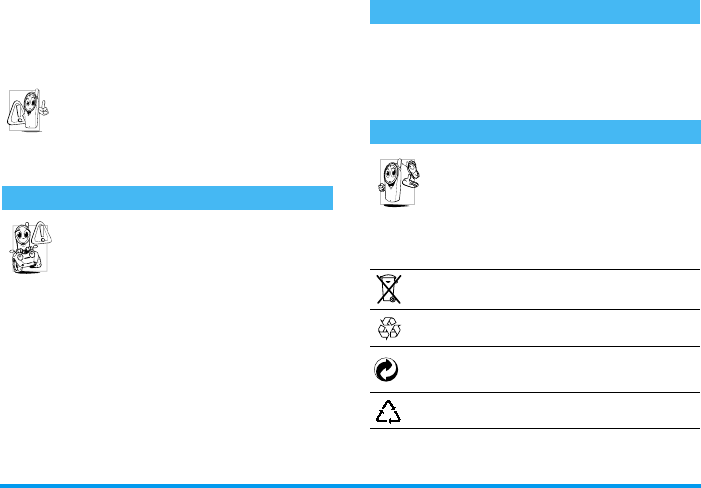
Precautions 33
• Do not deform or open the battery.
• Do not allow metal objects (such as keys in your
pocket) to short circuit the battery contacts.
• Avoid exposure to excessive heat (>60°C or 140°F),
moisture or caustic environments.
You should only use Philips Authentic Accessories,
as the use of any other accessories may damage your
phone and will make all guarantees for your Philips
phone null and void.
Make sure damaged parts are replaced immediately by a
qualified technician and that they are replaced with genuine
Philips replacement parts.
It lowers concentration, which can be dangerous.
Adhere to the following guidelines: Give your full
attention to driving. Pull off the road and park
before using the phone. Respect the local
regulations in countries where you drive and use
your GSM phone. If you want to use your phone in a vehicle,
install the hands-free car kit which is designed for that
purpose, still ensuring you give full attention to driving.
Ensure that your phone and car kit do not block any air bags
or other security devices fitted in your car. The use of an alarm
system to operate a vehicle's light or horn to indicate
incoming phone calls is prohibited on public roads in some
countries. Check local regulations.
In case of hot weather or after a prolonged exposure to the sun
(e.g. behind a window or a windscreen), the temperature of
your phone's casing might increase, especially when featuring
a metallic finish. Be very careful in this case when picking up
your phone and also avoid using it with an ambient
temperature over 40°C.
Remember to observe the local regulations
regarding the disposal of your packaging materials,
exhausted batteries and old phone and please
promote their recycling.
Philips has marked the battery and packaging with standard
symbols designed to promote the recycling and appropriate
disposal of your eventual waste.
Do not use your phone while driving
EN 60950 Norm
Environmental care
The battery should not be disposed of with
general household waste.
The labelled packaging material is recyclable.
A financial contribution has been made to the
associated national packaging recovery and
recycling system (e.g. EcoEmballage in France).
The materials are recyclable (also identifies the
plastic material).


















